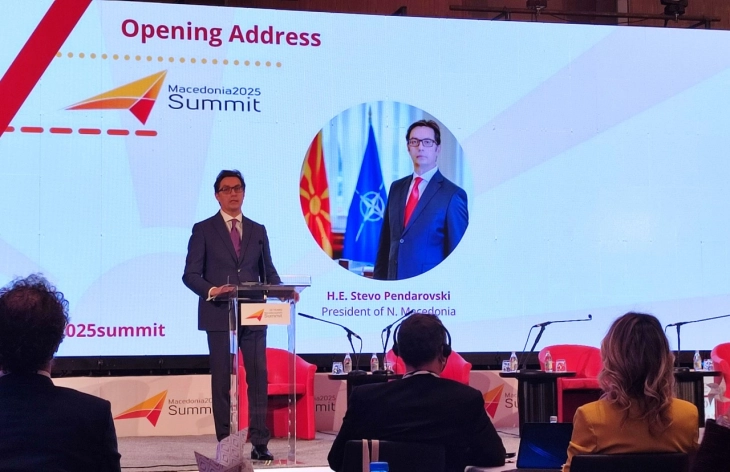Energy crisis, price hikes, other challenges must not prevent digitization, Pendarovski tells Macedonia2025 Summit

Skopje, 18 November 2021 (MIA) – There is no proper environment for the start of positive change. Proper environment results from positive change. The success of our generation will be measured on whether we manage to secure a better future for the youth here, in the Republic of North Macedonia. We will achieve this only if we build a progressive society based on knowledge, and a sustainable economy founded on technology, said President Stevo Pendarovski in his address at the 10th Macedonia2025 Summit focusing on digitization.
President Pendarovski said that as much as it seems inappropriate to talk about digitization in a time when the country is faced with a serious energy crisis and price hikes, current challenges should not prevent the planning of this required step in development.
“We have only one option: instead of waiting for turbulent events to end, we need to double our efforts in rethinking the foundations of our economic growth and development,” noted Pendarovski.
He referred to the latest Eurostat data that the average level of digitization and digital skills in North Macedonia is 32 percent, way below the EU average of 56 percent.
“Although a vast majority of our citizens have access to the Internet, most of them use it primarily for news and social media. We have to focus our efforts on developing digital literacy and skills because they have already become an irreplaceable criterion for equal involvement in the global labor market,” said Pendarovski.
He added that North Macedonia boasts with a solid IT sector that grows by the year through job creation and rise of its share in the economy.
“Besides cutting unemployment and economic growth, digitization also ensures the transparency that is required to minimize the perhaps most severe disease for every country – corruption. This includes the everyday, so-called benign corruption in public services, but mostly the malign corruption related to organized crime,” said Pendarovski.
In its latest strategic report, he added, the European Commission identifies digital hyper-connectivity and technological transformation as one of the four key global trends affecting the EU by 2050, with half of the professions to be automated in the near future, while others will become redundant.
On the current global recession caused by the pandemic, the President said it exceeds the effects of the 2008 financial crisis by its intensity and scope.
“This, let me call it, concentration of crises, has shown our structural and systemic shortcomings, similarly to other places across the globe. The current energy crisis puts added pressure on the economy, businesses and citizens, because we are highly dependent on energy import. Therefore, we only have one option. Instead of waiting for turbulent events to end, we need to double our efforts in rethinking the foundations of our economic growth and development. We are not alone in this. Many national strategies and plans will have to be revised and adapted to the new reality, for an easier and more sustainable post-covid recovery,” said Pendarovski.
The World Economic Forum assesses that due to accelerated digitization of the global economy, as much as 70 percent of the value created through production and services in the next decade will be based on digital business models, where digital societies with a developed digital infrastructure and culture of innovative, inclusive and sustainable business strategies will have the upper hand.
The President also referred to the 2021 Global Corruption Index, which shows that digitally most developed European countries have the lowest degrees of corruption.
“In addition, digitization will raise the level of services for citizens, contribute to more accurate and timely data on country trends, facilitate business operations, create a favorable environment for innovations, opening of incubators and startups, and education of a new generation of digital nomads.
Macedonia2025 CEO Nikica Mojsovska Blazhevski said the organization’s vision is for the country to become the leading economy and most prosperous country in the region, as well as promote sustainable economic development and improve opportunities for people, businesses and foreign investors.
“I hope our vision will prevent brain drain, especially of the youth, said Mojsovska Blazhevski.
The Macedonia2025 Summit includes five panels, with 28 speakers to address over 100 in-person and over 300 online guests.
The summit will promote the latest achievements, trends, knowledge and skills in the field of digitization, circular economy, successful regional businesses in the field of technology and ICT sector, but also tackle burning economic issues – inflation, economic growth, energy crisis and others.
Macedonia2025 and the Macedonian Academy of Sciences and Arts (MANU) have set up a team comprised of over 20 members working on Digital Initiative MK2025. Its members come from business chambers, political parties, the Minister of Information Society and Administration, a representative from the Office of the Deputy PM for Economic Affairs, representatives from several diplomatic offices and NGOs.







